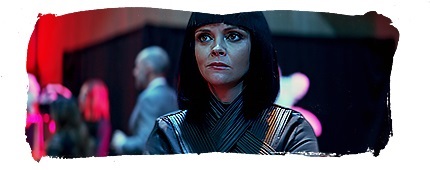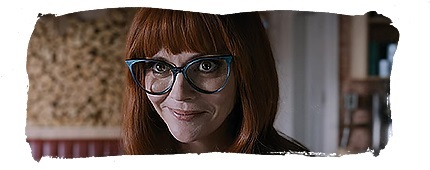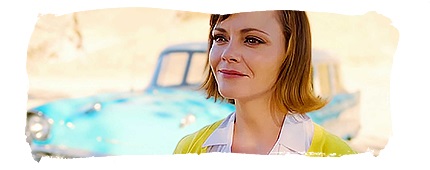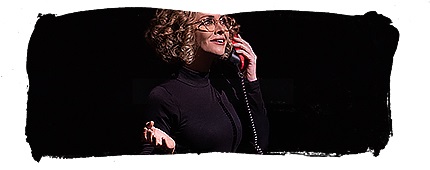
|
14
Sep 2009
Webmiss
|
Long after finding fame at age 11 as Wednesday Addams in the film version of “The Addams Family,†Christina Ricci has found her voice in public policy. After playing a victim of sexual abuse in “Black Snake Moan,†Ricci, 29, was asked to become the spokeswoman for the Rape, Abuse and Incest National Network (RAINN). Last week she zigzagged around Capitol Hill to ask lawmakers for their support for legislation relating to rape and sexual abuse.
How did you first hear about RAINN?
When I was 15, I was reading about Tori Amos in Rolling Stone magazine, and she talked about how she, along with Scott [Berkowitz, RAINN’s president], had co-founded RAINN. And after that, they’ll ask us as actresses, “If you come to this fashion show, we’ll donate $10,000 to your favorite charity.†And I always picked RAINN. And I always had an interest in rape crisis intervention and what happens to women when rape is untreated, and rape-trauma syndrome. And then I did a movie that was all about rape trauma syndrome, and after that movie, RAINN invited me to become even more active and to become their spokesperson.
Have you ever been to Capitol Hill before?
I’ve been to the Hill once before, so this is my second time. It’s intimidating as all hell, every time I come, but then it always turns out to be a great thing. I feel so fortunate to be … one of the few Americans that actually can go and meet with people and say, “This is what I care about — please help us.â€
Are you nervous about meeting members of Congress?
It’s just intimidating. I mean, I barely graduated high school, and I’m an actress, so we’re not by nature that intelligent. But when there are things that really matter to you, it’s great to know that you can actually take part in making a difference. I can’t volunteer and be an advocate because I’m not anonymous, so this is how I can help in this situation.
Who would you most like to meet while you’re in Washington?
Oh, my God, if I met Biden, I would lose my mind. He wrote the Violence Against Women Act, and I love him. I think he’s great. And of course, no doubt, I want to meet Obama. But that’s not really going to happen.
Who are some of your political heroes?
I actually love James Carville, but I know he might not be considered by some to be a political hero. His work over the years, I really love and respect him. And I love [Rep.] Ted Poe (R-Texas) for all of the work he’s done for our cause and for children’s rights and no parole for sex offenders. I just love him. And Biden; Biden’s a huge hero of mine. I was so excited when he got picked [as vice president]. I was just overjoyed.
Do you affiliate yourself with a political party?
For now, while I’m doing this kind of work, I prefer to publicly be bipartisan, just because I feel like this is a bipartisan issue. And I don’t feel like the figurehead of it should be at all partisan.
Is the timing of your visit important?
Recession always makes crime rise, and we’re seeing a definite rise in rapes and assaults, and our funding is going down because of the recession, when really what needs to happen is we need to be taking care of our society right now while it’s suffering from the damage that was done to our economic strength in the past. You don’t abandon the people while you fix the economy. You come back and it’s going to be like ’70s warfare again on the streets of Manhattan.
And given what just happened recently, it’s been all over the news, with the girl, Jaycee [Dugard] — I feel like this is a really great time for people to take note and for people to say this legislation is incredibly timely and necessary.
What response have you been getting from lawmakers on Capitol Hill?
People really respond to this. We have some great supporters. There was money for RAINN included in a Senate bill, but it wasn’t included in the House’s. And then language was attached to the House’s bill to try and protect RAINN, so now we need the support of certain Congress people, so that when they go in for negotiations, someone is there championing … the Violence Against Women Act, which directly goes to affecting RAINN and rape crisis centers.
What educational experience from your research for “Black Snake Moan†has helped you in your work with RAINN?
I had been working a lot with RAINN over the years, and I had done a lot of women’s studies on my own and read a lot about victims of these crimes, and I had this sense of wanting to do something that would really highlight the injustice or people’s misunderstanding of what’s really going on when a woman exhibits the symptoms of rape trauma syndrome.
What was the extent of your political and advocacy engagement before joining forces with RAINN?
Nothing that was really public. I would always go and march for the president that I felt should be elected, but nothing like this. It’s so amazing, just being a regular person and all of a sudden someone’s like, “You should come to the Hill and talk with congressmen.†I was just like, “Wait, what? You can do that? Are you serious? A’ight, cool.†It’s been really, really amazing, and when I talk to my friends about it, they say, “Oh, you can do that?†And I just think that not enough people in our country are educated about their ability to actually talk to their representatives.
What do you think the role is for writers, actors and directors to dispel or propel the stigma and stereotypes around rape?
I think … as actors, we could lend ourselves and sort of attract attention to an issue, and then have the people with information put it out there and be heard … I think it’s very, very important that we continue to do socially conscious films. It really is my dream to only do those kinds of movies, as pretentious as that sounds. … But it’s a business, so once in a blue moon you’ll get something where you really believe in it and you really have to do it. And then the rest of the time you’re like, “All right, this is awesome — cool, it’s a comedy.†You have to climb up the ladder.
What other political issues are you interested in taking part in?
This is really it. This is mine. I have a lot of interest in things like the Fresh Air Fund and programs for inner-city kids. I’ve just been concentrating so much on this that I haven’t had time necessarily to get into that, but I think there’s something to be done about the number of children who are really abandoned in this country and not cared for. And people go outside this country all of time to adopt [children], and it’s like, you know what, take a trip to the south side of Chicago, see how you feel.
From The Hill































